Democratic presidential candidate Joe Biden is dismissing calls to apologize for saying that the Senate "got things done" with "civility" even when the body included segregationists with whom he disagreed.
His rivals for the 2020 nomination, including the two major black candidates in the race, roundly criticized Biden's comments. But Biden didn't back down Wednesday and was particularly defiant in the face of criticism from New Jersey Sen. Cory Booker, who said the former vice president should apologize.
Biden said Booker should apologize because the senator "should know better" than to question Biden's commitment to civil rights.
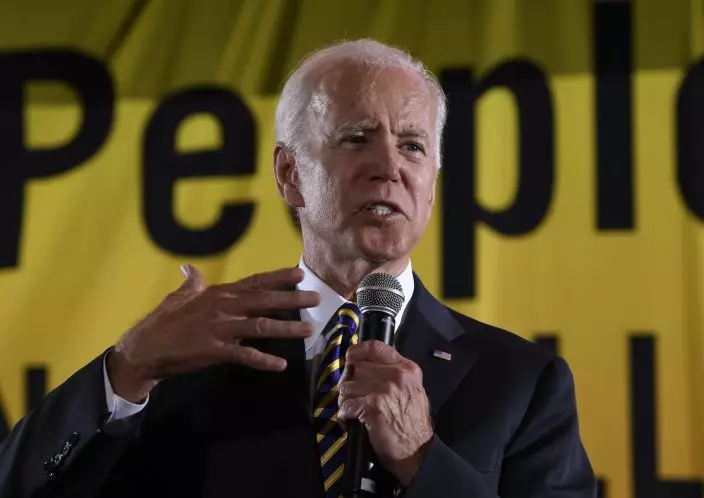
Democratic presidential candidate, former Vice President Joe Biden, speaks at the Poor People's Moral Action Congress presidential forum in Washington, Monday, June 17, 2019. (AP PhotoSusan Walsh)
"There's not a racist bone in my body," Biden said. "I've been involved in civil rights my whole career."
Booker's response: "I was raised to speak truth to power and that I shall never apologize for doing that. And Vice President Biden shouldn't need this lesson," he told CNN.
It's becoming one of the most intense disputes of the primary, showing the hazards for Biden as he tries to turn his decades of Washington experience into an advantage. Instead, he's infuriating Democrats who say he's out of step with the diverse party of the 21st century and potentially undermining his argument that he's the most electable candidate to take on President Donald Trump.
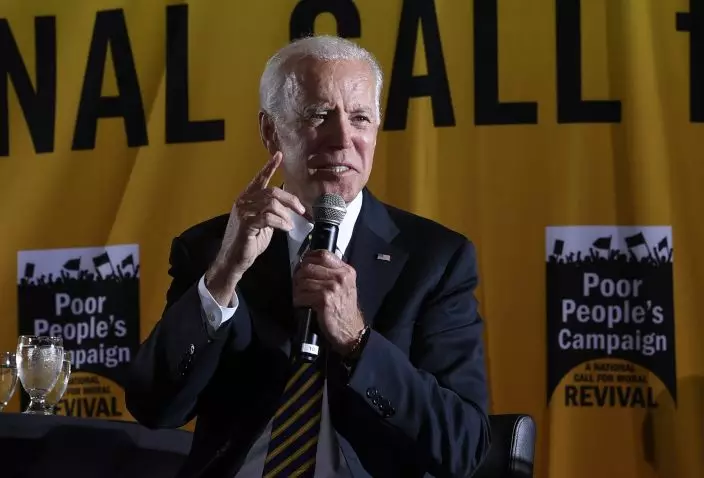
Democratic presidential candidate former Vice President Joe Biden, speaks at the Poor People's Moral Action Congress presidential forum in Washington, Monday, June 17, 2019. (AP PhotoSusan Walsh)
At a New York fundraiser Tuesday, Biden pointed to two long-dead segregationist senators, Democrats James Eastland of Mississippi and Herman Talmadge of Georgia, to argue that Washington functioned more smoothly a generation ago than under today's "broken" hyperpartisanship.
"We didn't agree on much of anything," Biden said of the two men, who were prominent lawmakers when Biden was elected in 1972. Biden described Talmadge as "one of the meanest guys I ever knew" and said Eastland called him "son," though not "boy," a reference to the racist way many whites addressed black men at the time.
Yet even in that Senate, Biden said, "At least there was some civility. We got things done."
Biden's rivals quickly pounced.
"I have to tell Vice President Biden, as someone I respect, that he is wrong for using his relationships with Eastland and Talmadge as examples of how to bring our country together," said Booker, who is African American.
New York City Mayor Bill de Blasio, a white man who is married to a black woman, tweeted: "It's 2019 & @JoeBiden is longing for the good old days of 'civility' typified by James Eastland. Eastland thought my multiracial family should be illegal."
California Sen. Kamala Harris, who is black, said Biden was "coddling" segregationists in a way that "suggests to me that he doesn't understand ... the dark history of our country" — a characterization Biden's campaign rejects.
Former Texas Rep. Beto O'Rourke said that for Biden "to somehow say that what we're seeing in this country today is a function of partisanship or a lack of bipartisanship completely ignores the legacy of slavery and the active suppression of African Americans and communities of color right now."
The tumult comes at a crucial point in the campaign. Biden is still recovering from controversy earlier this month when he angered many Democrats by saying he didn't support federal taxpayer money supporting abortion. He later reversed his position.
He's among the more than 20 candidates who will be in South Carolina this weekend to make their case to black voters at a series of events.
Meanwhile, most of the candidates will gather in Miami next week for the first presidential debate of the primary season. Biden will almost certainly face criticism for the comments.
He tried to defuse the tension by saying he was trying to argue that leaders sometimes have to work with people they disagree with to achieve goals, such as renewing the Voting Rights Act.
"The point I'm making is you don't have to agree. You don't have to like the people in terms of their views," he said. "But you just simply make the case and you beat them without changing the system."
He has received support from some black leaders. Louisiana Rep. Cedric Richmond, Biden's campaign co-chairman and a former Congressional Black Caucus chairman, said Biden's opponents deliberately ignored the full context of his argument for a more functional government.
"Maybe there's a better way to say it, but we have to work with people, and that's a fact," Richmond said, noting he dealt recently with President Donald Trump to pass a long-sought criminal justice overhaul. "I question (Trump's) racial sensitivity, a whole bunch of things about his character ... but we worked together."
Likewise, Richmond said, Biden mentioned Jim Crow-era senators to emphasize the depths of disagreements elected officials sometimes navigate. "If he gets elected president, we don't have 60 votes in the Senate" to overcome filibusters, Richmond noted. "He could be less genuine and say, 'We're just going to do all these things.' But we already have a president like that. (Biden) knows we have to build consensus."
Biden also drew a qualified defense from Republican Sen. Tim Scott of South Carolina, the only black senator from his party.
Scott said that Biden "should have used a different group of senators" to make his point but that his remarks "have nothing to do with his position on race" issues. Scott said the reaction reflects an intense environment for Democrats in which the desire to defeat Trump means "anything the front-runner says that is off by a little bit" will be magnified.
Associated Press writer Brian Slodysko in Chevy Chase, Maryland, contributed to this report.
Follow Bill Barrow on Twitter at https://twitter.com/BillBarrowAP and Elana Schor at https://twitter.com/eschor
UNITED NATIONS (AP) — The United States vetoed a widely backed U.N. resolution Thursday that would have paved the way for full United Nations membership for Palestine, a goal the Palestinians have long sought and Israel has worked to prevent.
The vote in the 15-member Security Council was 12 in favor, the United States opposed and two abstentions, from the United Kingdom and Switzerland. U.S. allies France, Japan and South Korea supported the resolution.
The strong support the Palestinians received reflects not only the growing number of countries recognizing their statehood but almost certainly the global support for Palestinians facing a humanitarian crisis caused by the war in Gaza, now in its seventh month.
The resolution would have recommended that the 193-member U.N. General Assembly, where there are no vetoes, approve Palestine becoming the 194th member of the United Nations. Some 140 countries have already recognized Palestine, so its admission would have been approved, likely by a much higher number of countries.
U.S. deputy ambassador Robert Wood told the Security Council that the veto “does not reflect opposition to Palestinian statehood but instead is an acknowledgment that it will only come from direct negotiations between the parties."
The United States has “been very clear consistently that premature actions in New York — even with the best intentions — will not achieve statehood for the Palestinian people,” deputy State Department spokesman Vedant Patel said.
His voice breaking at times, Palestinian U.N. Ambassador Riyad Mansour told the council after the vote: “The fact that this resolution did not pass will not break our will and it will not defeat our determination.”
“We will not stop in our effort,” he said. “The state of Palestine is inevitable. It is real. Perhaps they see it as far away, but we see it as near.”
This is the second Palestinian attempt for full membership and comes as the war in Gaza has put the more than 75-year-old Israeli-Palestinian conflict at center stage.
Palestinian President Mahmoud Abbas first delivered the Palestinian Authority’s application for U.N. membership in 2011. It failed because the Palestinians didn’t get the required minimum support of nine of the Security Council’s 15 members.
They went to the General Assembly and succeeded by more than a two-thirds majority in having their status raised from a U.N. observer to a non-member observer state in 2012. That opened the door for the Palestinian territories to join U.N. and other international organizations, including the International Criminal Court.
Algerian U.N. Ambassador Amar Bendjama, the Arab representative on the council who introduced the resolution, called Palestine’s admission “a critical step toward rectifying a longstanding injustice" and said that “peace will come from Palestine’s inclusion, not from its exclusion.”
In explaining the U.S. veto, Wood said there are “unresolved questions” on whether Palestine meets the criteria to be considered a state. He pointed to Hamas still exerting power and influence in the Gaza Strip, which is a key part of the state envisioned by the Palestinians.
Wood stressed that the U.S. commitment to a two-state solution, where Israel and Palestine live side-by-side in peace, is the only path for security for both sides and for Israel to establish relations with all its Arab neighbors, including Saudi Arabia.
“The United States is committed to intensifying its engagement with the Palestinians and the rest of the region, not only to address the current crisis in Gaza, but to advance a political settlement that will create a path to Palestinian statehood and membership in the United Nations,” he said.
Mansour, the Palestinian U.N. ambassador, reiterated the commitment to a two-state solution but asserted that Israel believes Palestine "is a permanent strategic threat."
"Israel will do its best to block the sovereignty of a Palestinian state and to make sure that the Palestinian people are exiled away from their homeland or remain under its occupation forever,” he said.
He demanded of the council and diplomats crowded in the chamber: “What will the international community do? What will you do?”
Israeli-Palestinian negotiations have been stalled for years, and Israel’s right-wing government is dominated by hard-liners who oppose Palestinian statehood.
Israeli U.N. Ambassador Gilad Erdan called the resolution “disconnected to the reality on the ground” and warned that it “will cause only destruction for years to come and harm any chance for future dialogue.”
Six months after the Oct. 7 attack by the Hamas militant group, which controlled Gaza, and the killing of 1,200 people in “the most brutal massacre of Jews since the Holocaust,” he accused the Security Council of seeking “to reward the perpetrators of these atrocities with statehood.”
Israel’s military offensive in response has killed over 32,000 Palestinians, according to Gaza’s health ministry, and destroyed much of the territory, which speaker after speaker denounced Thursday.
After the vote, Erdan thanked the United States and particularly President Joe Biden “for standing up for truth and morality in the face of hypocrisy and politics.”
He called the Palestinian Authority — which controls the West Bank and the U.S. wants to see take over Gaza where Hamas still has sway — “a terror supporting entity.”
The Israeli U.N. ambassador referred to the requirements for U.N. membership – accepting the obligations in the U.N. Charter and being a “peace-loving” state.
“How can you say seriously that the Palestinians are peace loving? How?” Erdan asked. “The Palestinians are paying terrorists, paying them to slaughter us. None of their leaders condemns terrorism, nor the Oct. 7 massacre. They call Hamas their brothers.”
Despite the Palestinian failure to meet the criteria for U.N. membership, Erdan said most council members supported it.
“It’s very sad because your vote will only embolden Palestinian rejectionism every more and make peace almost impossible,” he said.
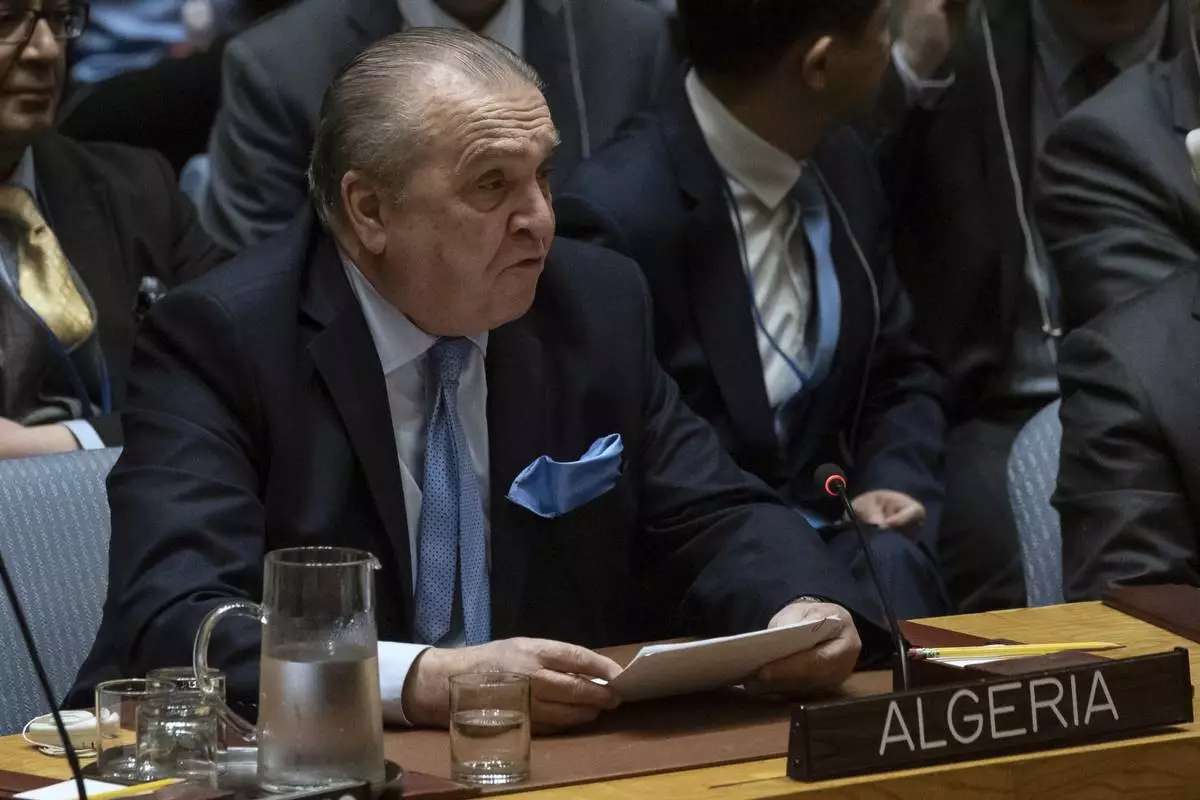
Algeria's Permanent Ambassador to the United Nations Amar Bendjama speaks during a Security Council meeting at United Nations headquarters, Thursday, April 18, 2024. (AP Photo/Yuki Iwamura)
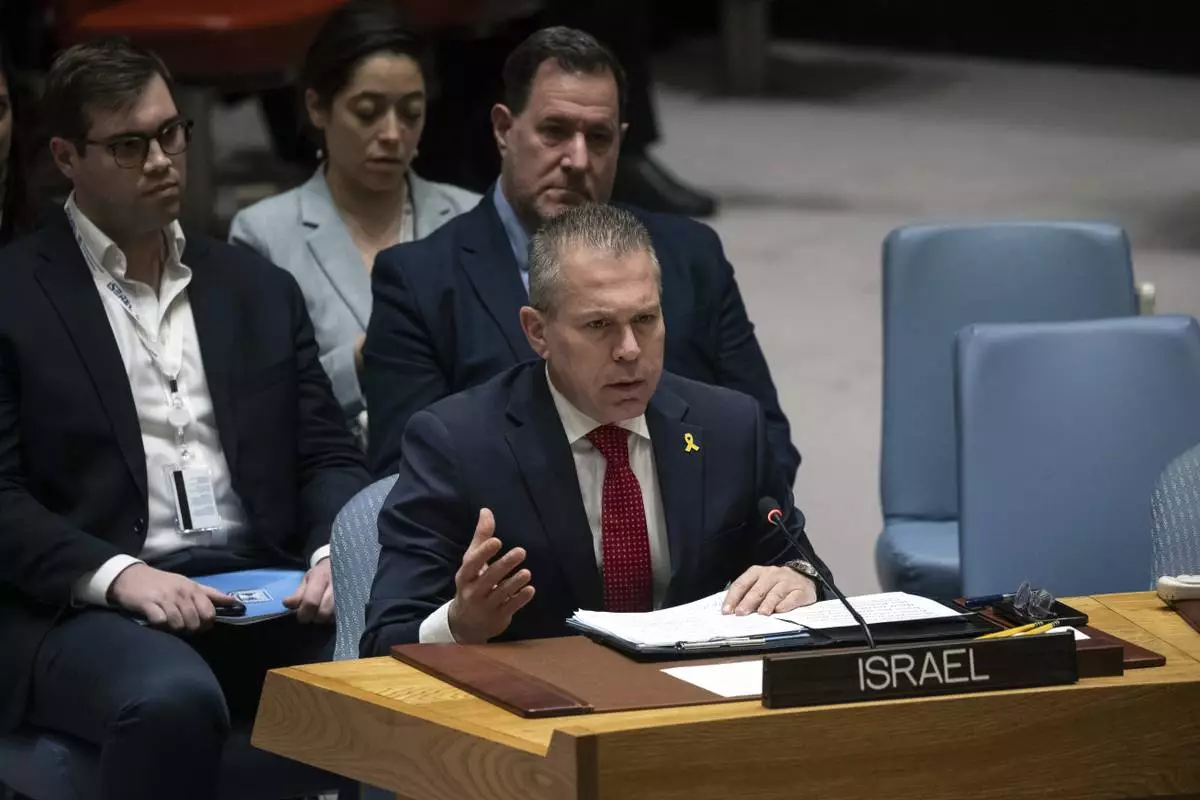
Israeli Ambassador to the United Nations Gilad Erdan speaks during a Security Council meeting at United Nations headquarters, Thursday, April 18, 2024. (AP Photo/Yuki Iwamura)
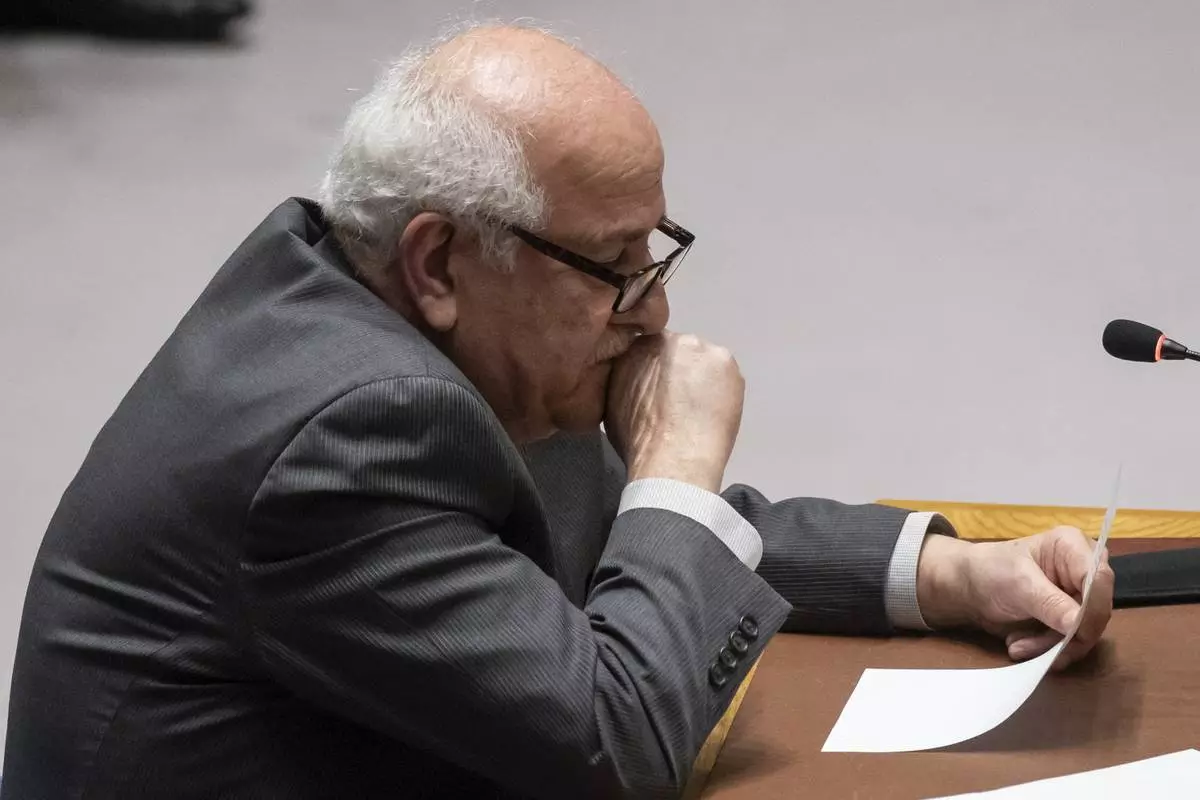
Palestinian Ambassador to the United Nations Riyad Mansour holds tears while speaking during a Security Council meeting at United Nations headquarters, Thursday, April 18, 2024. (AP Photo/Yuki Iwamura)
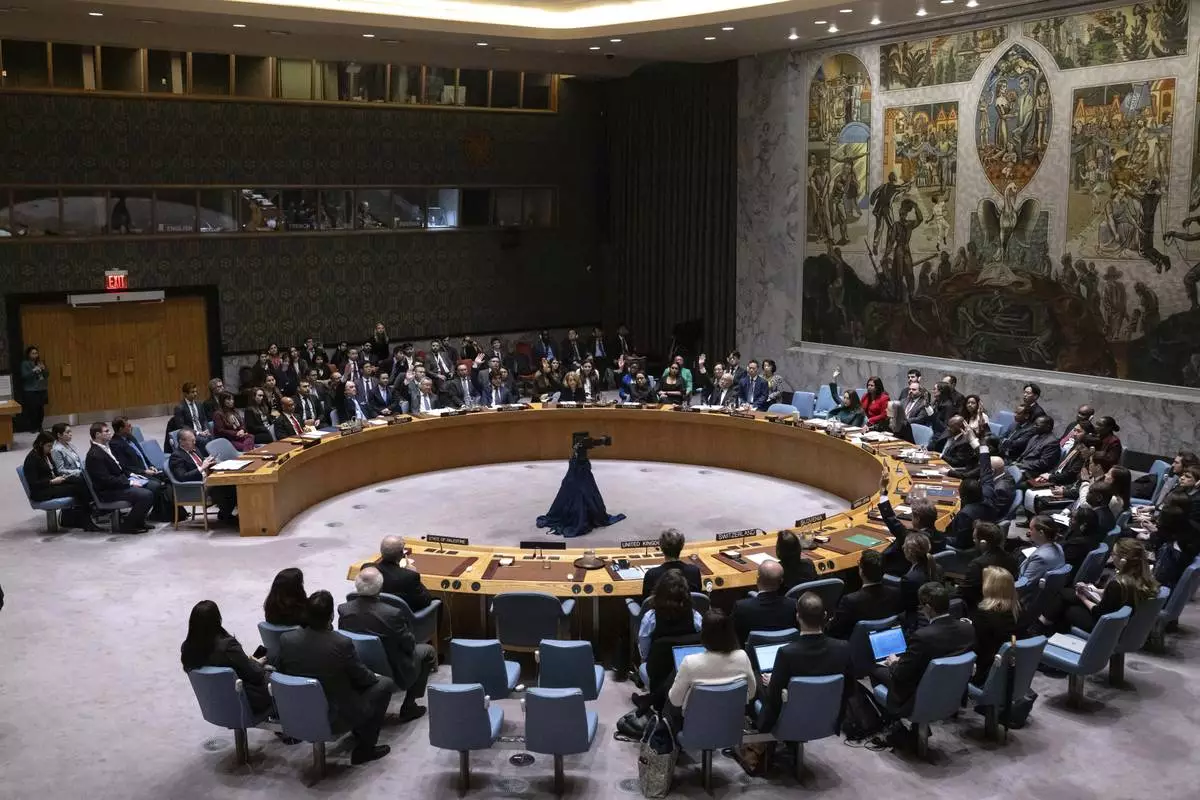
Representatives of member countries take votes during a Security Council meeting at United Nations headquarters, Thursday, April 18, 2024. (AP Photo/Yuki Iwamura)
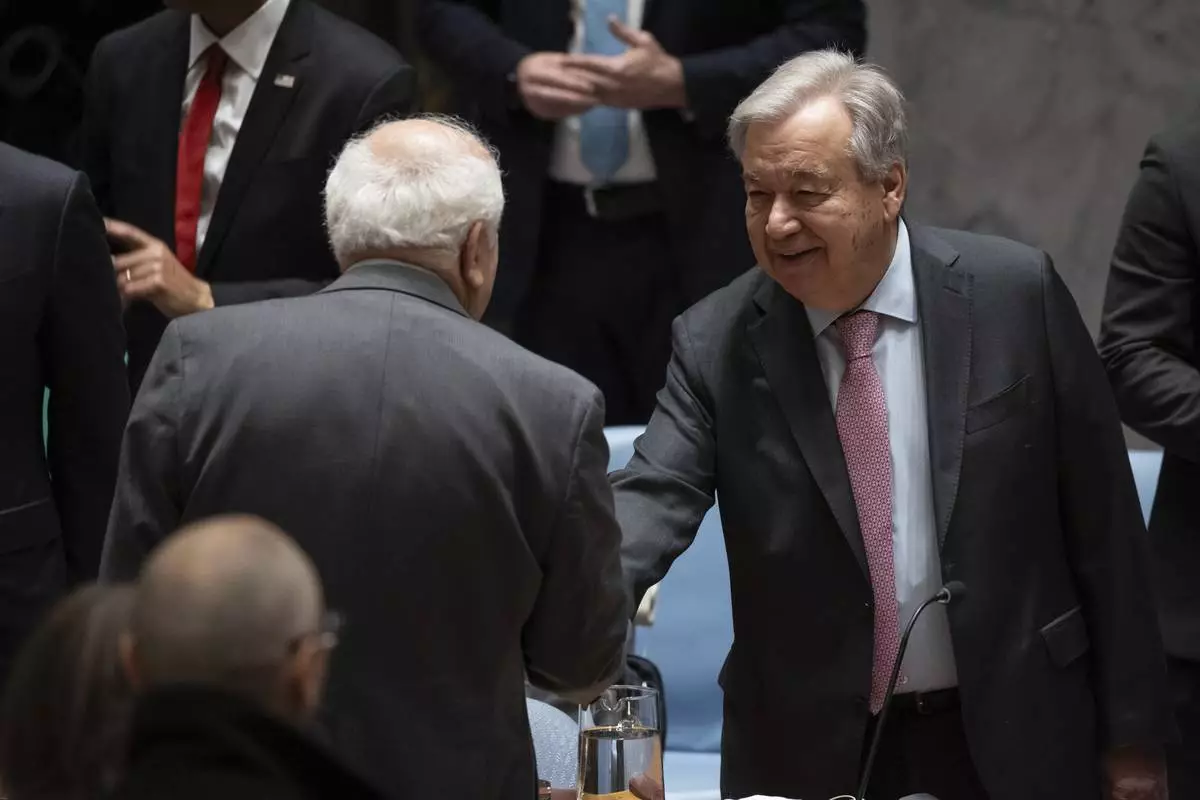
Palestinian Ambassador to the United Nations Riyad Mansour, left, and United Nations Secretary-General Antonio Guterres speak before a Security Council meeting at the United Nations headquarters, Thursday, April 18, 2024. (AP Photo/Yuki Iwamura)
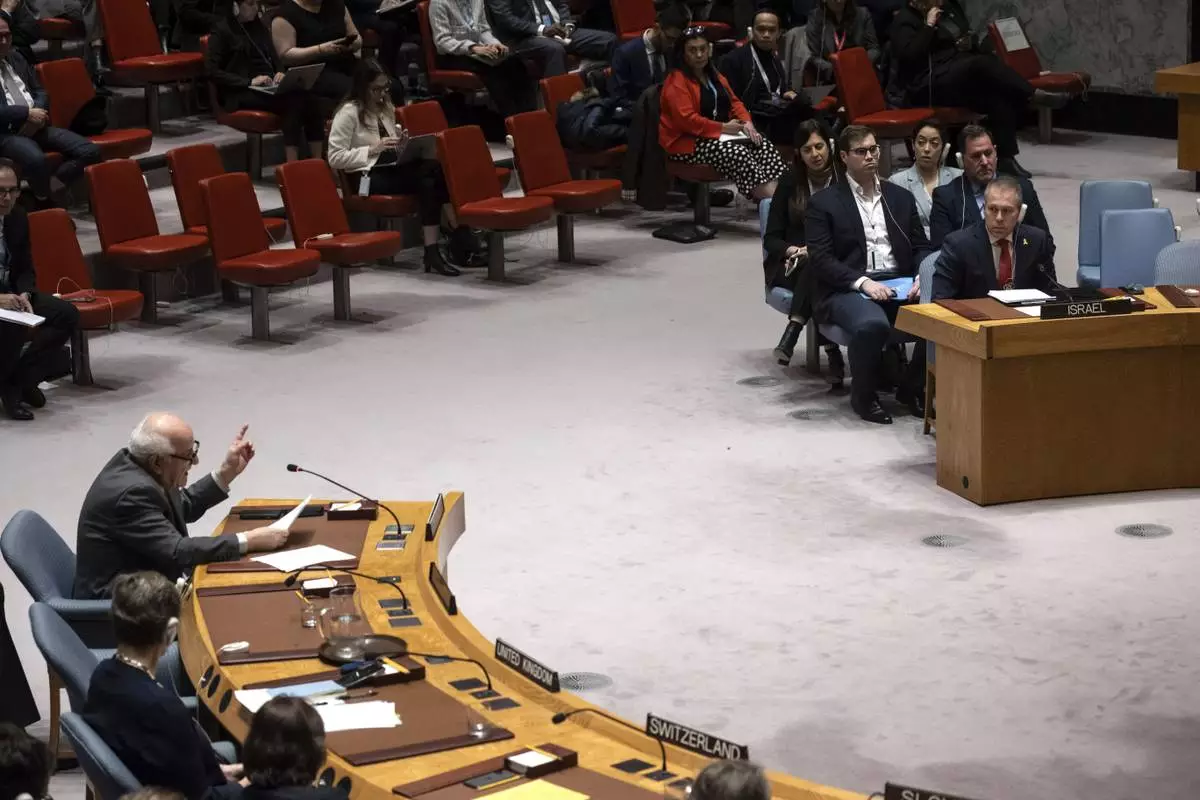
Palestinian Ambassador to the United Nations Riyad Mansour speaks during a Security Council meeting at United Nations headquarters, Thursday, April 18, 2024. (AP Photo/Yuki Iwamura)
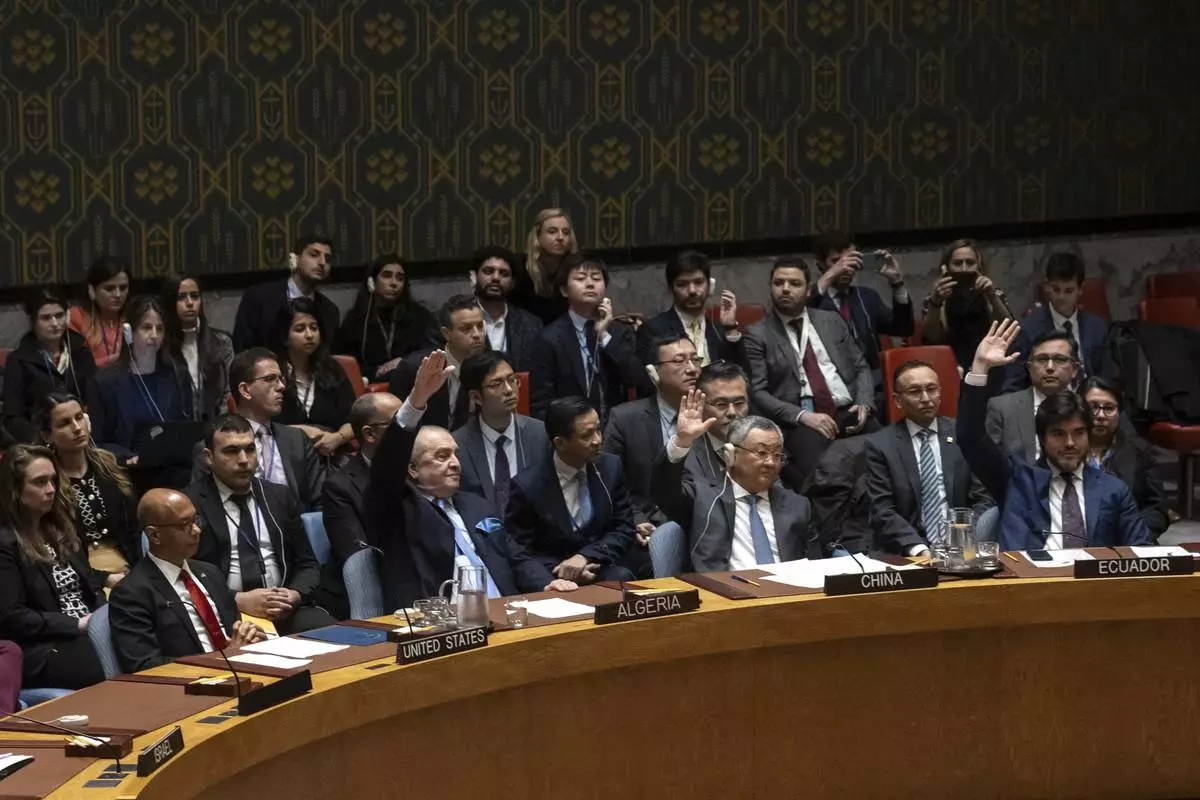
Representatives of member countries take votes during a Security Council meeting at United Nations headquarters, Thursday, April 18, 2024. (AP Photo/Yuki Iwamura)
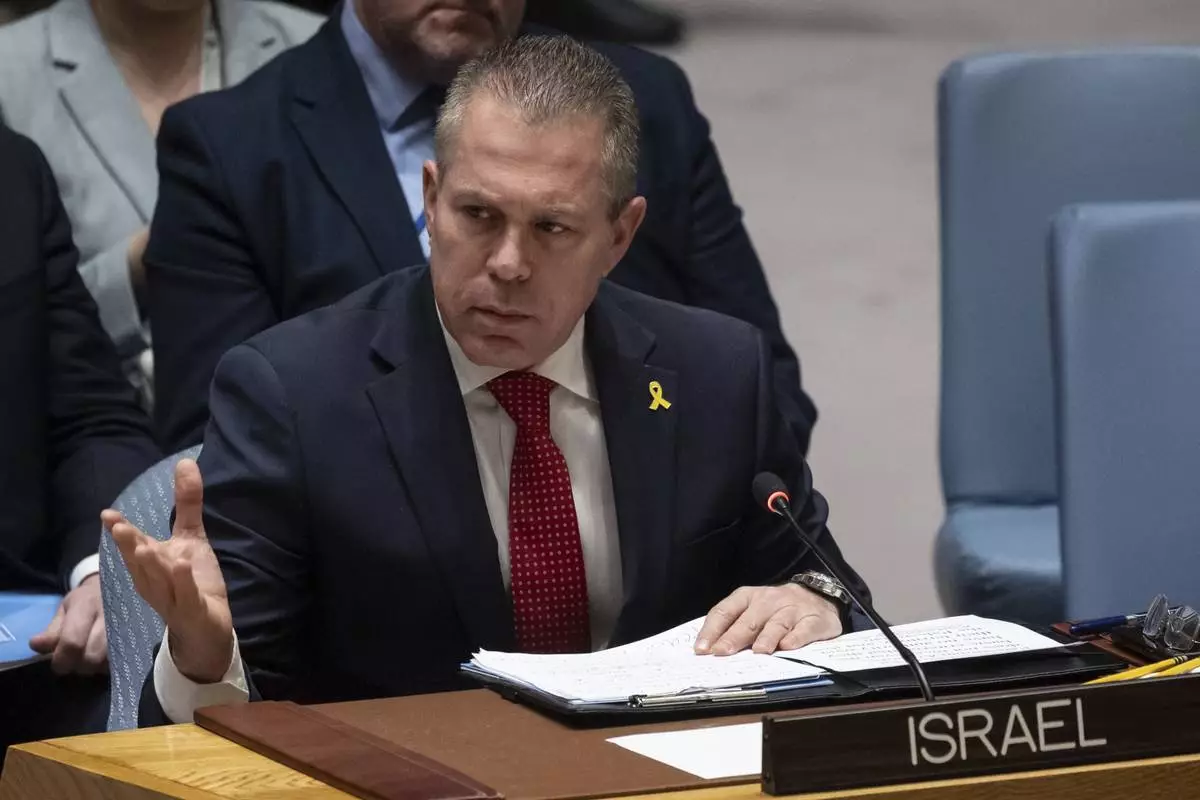
Israeli Ambassador to the United Nations Gilad Erdan speaks during a Security Council meeting at United Nations headquarters, Thursday, April 18, 2024. (AP Photo/Yuki Iwamura)
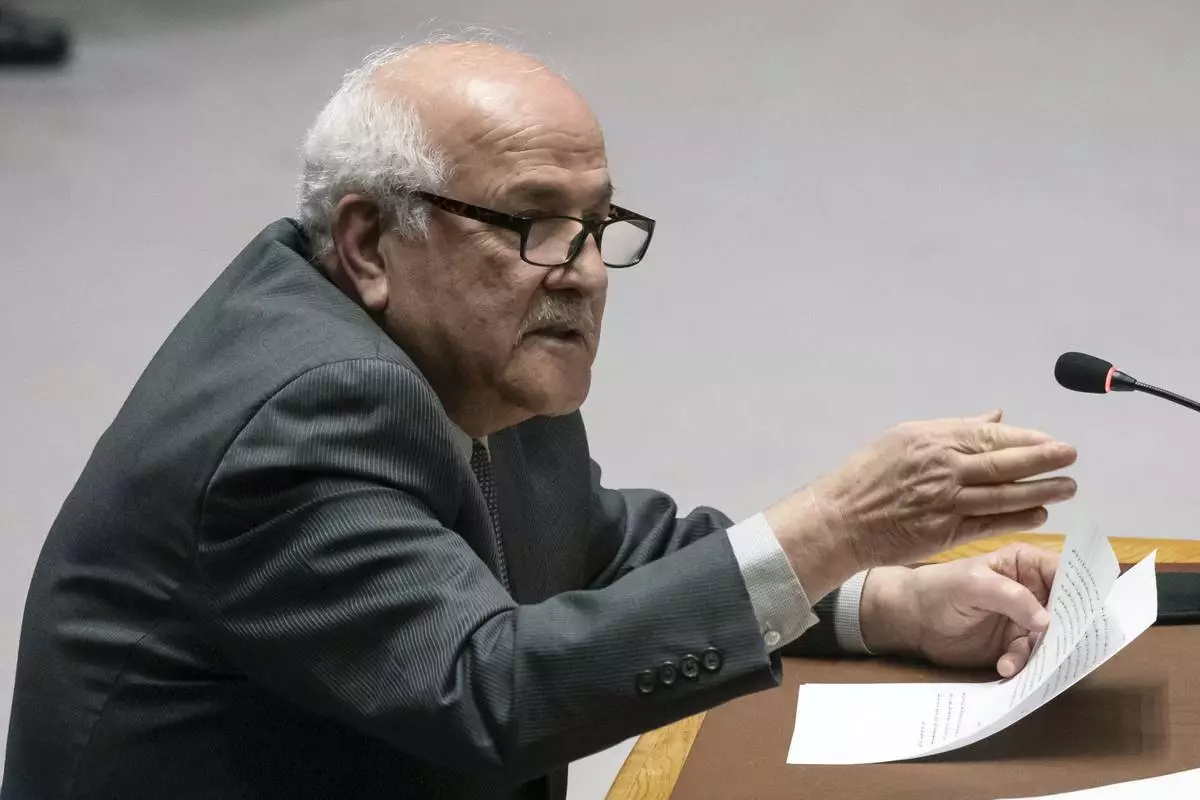
Palestinian Ambassador to the United Nations Riyad Mansour speaks during a Security Council meeting at United Nations headquarters, Thursday, April 18, 2024. (AP Photo/Yuki Iwamura)
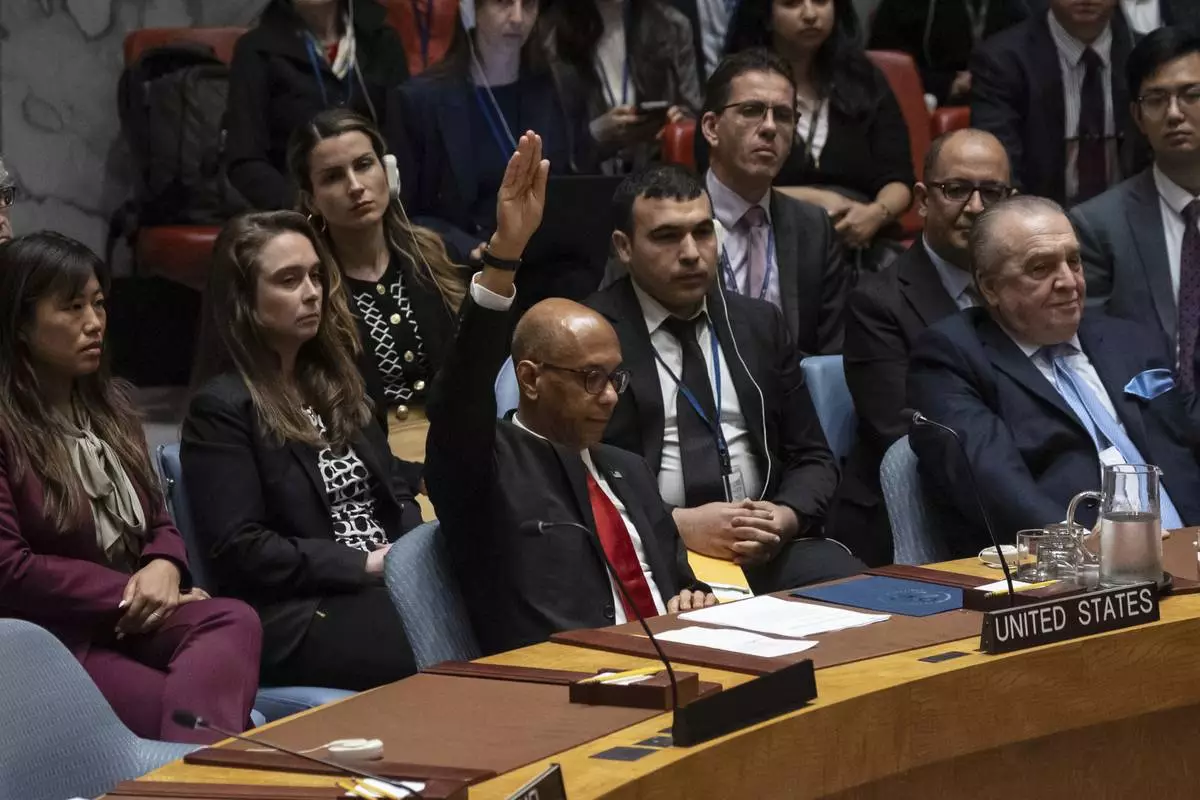
U.S. Deputy Ambassador Robert Wood votes against resolution during a Security Council meeting at United Nations headquarters, Thursday, April 18, 2024. (AP Photo/Yuki Iwamura)





















